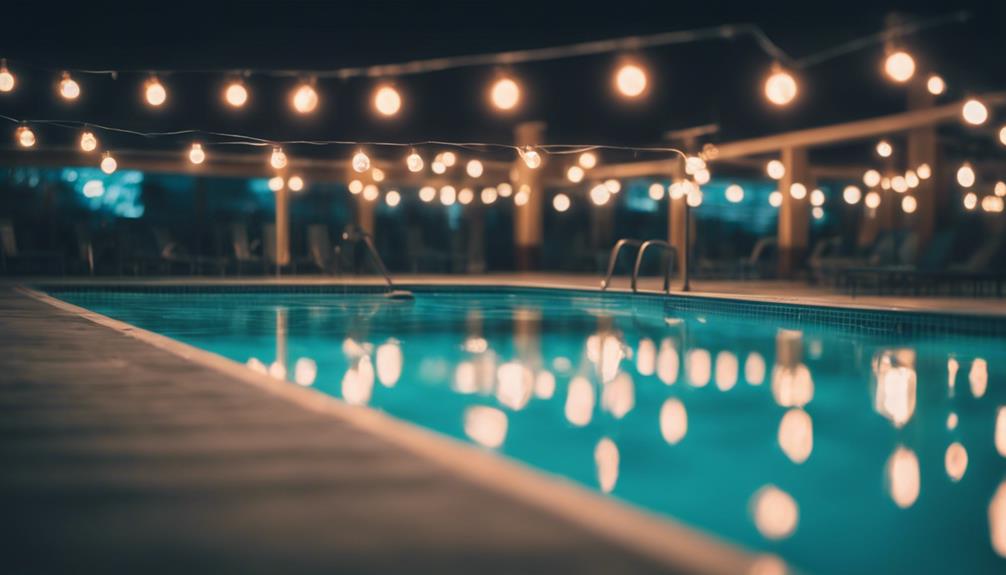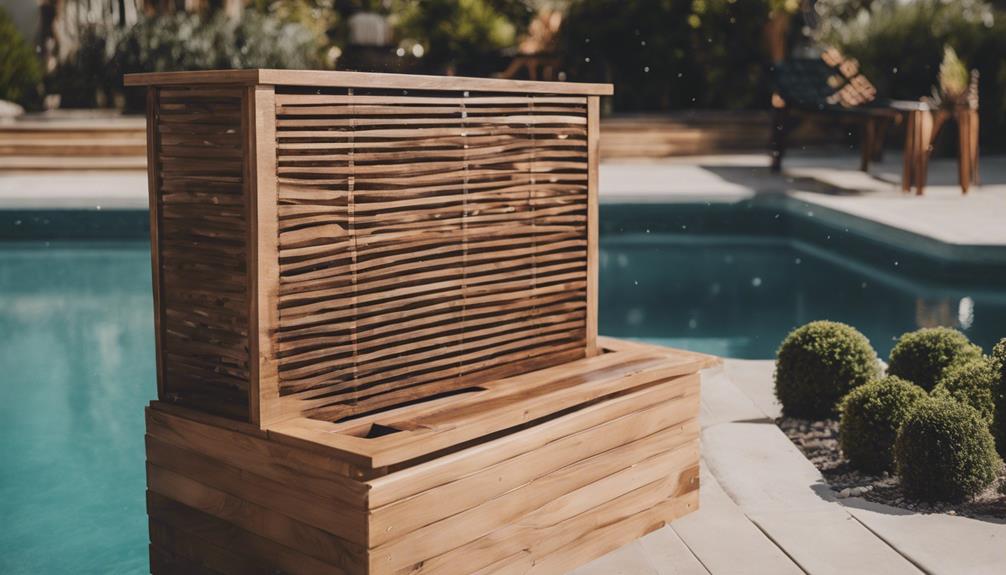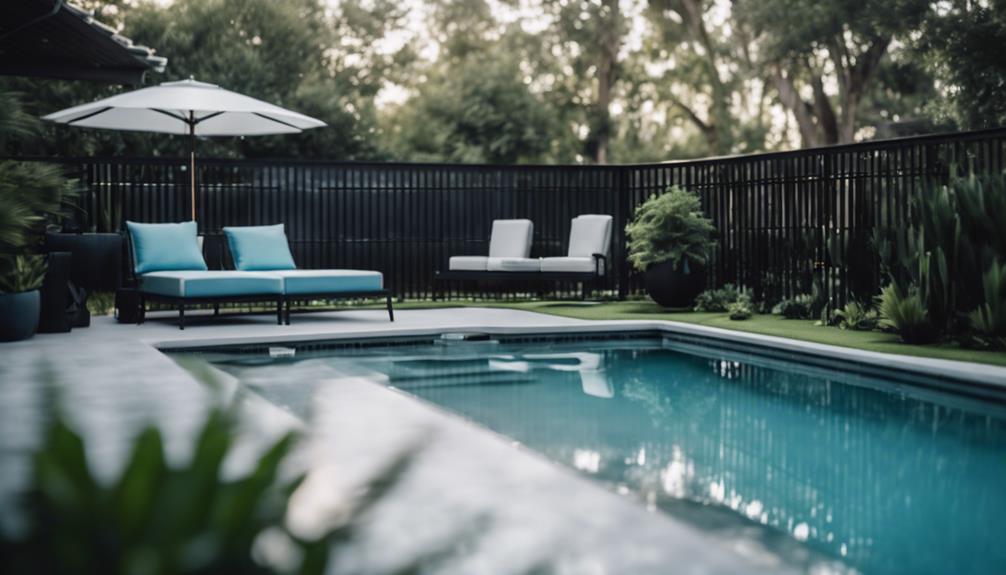So, let’s talk about swimming pool lights – they’re safe if you follow some important rules. First, always hire a licensed electrician to install them. Ensure they are properly grounded and have GFCIs for added safety. Also, choose underwater lights that meet safety standards. Regular professional inspections are essential as well! If you want to learn more about how to keep your pool well-lit and safe for nighttime swimming, stay tuned for additional helpful information.
Key Takeaways
- Proper installation by licensed electricians is crucial for safety.
- Regular inspections and use of GFCIs prevent electrical hazards.
- Waterproof LED lights are essential for a safe aquatic environment.
- Maintaining proper voltage levels ensures safe operation underwater.
- Consulting experts for high-quality fixtures enhances safety and aesthetics.
Safety Guidelines for Pool Light Installation
How can you guarantee the safety of your swimming pool lights during installation?
Well, it's essential to have your pool lights installed by a licensed electrician. This ensures that the electrical work is done properly, with the right grounding to prevent any potential shocks near the water.
When it comes to underwater pool lights, they must meet specific safety standards and be connected correctly to avoid any hazards that could arise.
Additionally, using ground fault circuit interrupters (GFCIs) is a smart move. These devices can automatically cut off power if there's any contact between water and the pool lights, adding an extra layer of safety.
Remember, regular inspections by professionals are key. They can spot any worn components, faulty wiring, or installation issues that might pose risks to you and your loved ones.
Lastly, never try to tinker with or fix pool lights on your own. Always seek the expertise of licensed electricians or pool service companies for safe maintenance and repairs. Your safety is worth the peace of mind!
Risks of Faulty Pool Lights

Faulty pool lights pose a significant risk of electrocution in swimming pools if not properly installed or maintained. When it comes to pool safety, electrical shock from malfunctioning lights is a serious concern.
Imagine taking an invigorating dip in the pool only to be met with a shocking surprise due to improper installation of your pool lights!
To prevent such dangers, it's essential to make sure that your pool lights are in excellent condition. Improper installation or maintenance can lead to hazardous situations that put swimmers at risk. Regularly inspecting your pool lights can help identify any issues before they escalate.
Always opt for quality pool lights from reputable sources to reduce the chances of accidents occurring.
Importance of Waterproof Pool Lights

Ensuring your swimming pool is equipped with waterproof lights is essential for maintaining a safe and enjoyable aquatic environment.
When it comes to pool safety, having lights that are specifically designed to withstand being underwater is vital. These waterproof pool lights not only provide illumination for your nighttime swims but also prevent any electrical hazards that could arise in a wet environment like a pool.
Preventing Pool Electrocution

Let's talk pool safety and preventing any shocking surprises.
First off, make sure those pool lights are grounded properly – it's like giving them a safety net.
Regular check-ups from electricians and installing safety switches, like GFCIs, are your secret weapons against pool electrocution.
Keep it safe, keep it fun!
Pool Light Grounding Importance
Properly grounding pool lights is essential for safeguarding against the risk of pool electrocution. When pool lights are installed, ensuring they're correctly grounded is vital in preventing electrical mishaps. Grounding helps redirect any electrical faults away from the pool water, keeping swimmers safe from potential shocks.
By securely grounding pool lights, you create a protective barrier that shields against faulty wiring or damaged lights. Remember, all pool lights should meet electrical safety standards to minimize any risks. It's not just about having a well-lit pool; it's also about ensuring that these lights are safely installed.
Regular inspections by licensed professionals play a key role in maintaining the proper grounding of pool lights. So, next time you take a dip in your pool, you can do so with peace of mind, knowing that your pool lights are grounded for your safety.
Regular Electrical Inspections
To prevent pool electrocution risks, regular electrical inspections by a licensed electrician are crucial. These inspections guarantee that your pool lighting system is safe and up to code, reducing the chances of electrical faults that could lead to dangerous situations. Here is a handy table to highlight the importance of regular electrical inspections and the role of fault circuit interrupters (GFCIs) in keeping your pool area safe:
| Regular Electrical Inspections | Fault Circuit Interrupters |
|---|---|
| Conducted by a licensed electrician | Automatically cut off power if water contact is detected |
| Identify and fix faulty wiring | Essential for preventing electric shocks in wet environments |
| Ensure pool lights are properly installed and maintained | Required by safety regulations for all outdoor electrical outlets |
| Check for any potential hazards regularly | Provide an added layer of protection for swimmers and pool users |
| Promote overall pool safety and peace of mind | Help safeguard against electrical accidents and injuries |
Safety Switch Installation
Installing safety switches, such as GFCIs, near your swimming pool is an essential step in preventing potential electrocution incidents and ensuring a safe pool environment. These nifty devices automatically shut off power when they sense electrical leaks, reducing the risk of shocks in pools.
Picture this: you're having a blast swimming, and a sudden electrical issue arises. The safety switch installation comes to the rescue, cutting off power immediately if water and electricity decide to dance together, keeping you safe and sound.
Remember, regularly testing and maintaining these switches is key to guarantee they work like a charm when needed. So, if you're a pool owner, this safety measure is a must-do to dodge any electrical hazards in and around the pool.
Stay safe, keep those switches in check, and enjoy your pool time without worrying about any unwanted electrifying surprises!
Types of Pool LED Lights

So, when it comes to LED pool lights, you've got some cool options to choose from.
From flush mount lights that blend right into your pool wall to battery-powered floating lights that add a fun vibe, there's something for everyone.
Popular LED Options
When considering popular LED options for your swimming pool lights, you have a variety of choices to enhance safety and ambiance.
LED pool lights are a fantastic choice for your pool lighting needs. These lights aren't only energy-efficient but also durable, thanks to their semiconductor nature.
You can opt for different styles like flush mount, surface mount, battery/solar powered floating lights, flood lights, and LED flex lights.
One of the great things about LED lights is that they emit less heat, which not only prevents damage but also reduces maintenance requirements. These lights are designed to be submersible, meeting safety standards for pool lighting.
For the best illumination and safety, consider going for 12-volt LED lights. They offer top-notch brightness while ensuring your pool area is well-lit and safe for everyone to enjoy.
Make a splash with these LED options and light up your pool in style!
Installation Considerations
Consider the various types of pool LED lights available for installation to enhance both safety and ambiance in your swimming pool. Here are some options to help you choose the right one:
- Flush Mount Pool Lights: These lights offer a seamless look along your pool wall, but keep in mind they require a niche to be carved for proper installation.
- Surface Mount Pool Lights: Easy to set up and with lower repair costs, surface mount lights sit on top of the pool's interior surface, providing adequate illumination.
- Battery/Solar Powered Floating Lights: These lights aren't only decorative but also enhance your pool's aesthetic appeal. Just remember, you'll need to replace the batteries when they run out.
- LED Flex Lights: For a stunning visual effect, LED flex lights can be arranged around your pool to offer RGB colors and even lighting.
Maintenance and Longevity
LED pool lights, known for their durability and energy efficiency, require minimal maintenance and offer an extended lifespan compared to traditional pool lights. These lights are designed to last longer, saving you time and money in the long run.
LEDs are like the superheroes of pool lighting – they consume less electricity, which not only reduces your energy costs but also helps the environment by promoting sustainability. Plus, they've built-in heat sinks that prevent overheating, ensuring they stay in top shape for a long time.
Ensuring Proper Voltage for Pool Lights

Maintaining the correct voltage for pool lights is essential for ensuring the safety of swimmers and preventing the risk of electric shock. Here's what you need to know about ensuring proper voltage for your pool lights:
- Stick to 12 Volts:
Pool lights typically operate at 12 volts to keep swimmers safe. This lower voltage reduces the risk of electric shock in the water.
- Choose LED Lighting:
Opt for LED pool lights as they're important and safe for use underwater. LED lights also emit a bright and pleasant glow for your nighttime swims.
- Avoid Overvoltage:
Overvoltage can be dangerous, so make sure to regulate the voltage properly. Too much voltage can lead to malfunctions and safety hazards.
- Follow Recommendations:
Adhering to recommended voltage levels is essential for the safe operation of your pool lights. Regularly check and maintain the voltage to ensure a safe swimming environment for everyone.
Benefits of LED Pool Lights

When looking to enhance your swimming pool's efficiency and safety, opting for LED pool lights brings a multitude of benefits. LED pool lights aren't only important but also provide superior brightness, enhancing safety for swimmers.
These lights consume less electricity, saving you money on operational costs in the long run. Additionally, LED pool lights emit less heat, which not only prevents damage but also guarantees a longer lifespan compared to traditional pool lights.
By choosing 12-volt LED pool lights, you can ensure top safety and brightness levels for your pool illumination needs. Remember, proper installation and maintenance of LED pool lights are essential for maximizing safety and performance in your pool lighting system.
Quality Assurance for Pool Lighting

To guarantee the safety and longevity of your pool lighting system, prioritizing quality assurance is crucial. Here are some key tips to make sure your pool lighting is high-quality:
- Use high-quality fixtures: Opt for durable lighting options to prevent safety hazards and ensure a longer lifespan for your pool lights.
- Proper wiring installation: Ensure the pool lights wiring is correctly set up in conduits to enhance longevity and minimize the risk of accidents.
- Regular maintenance: Stay on top of upkeep and keep an eye out for any issues to maintain safety standards and prevent potential hazards.
- Avoid cheap fixtures: Investing in quality pool lighting fixtures, such as halogen pool lights, can greatly reduce the chances of electrical incidents in your swimming pool.
Consulting With Pool Lighting Experts
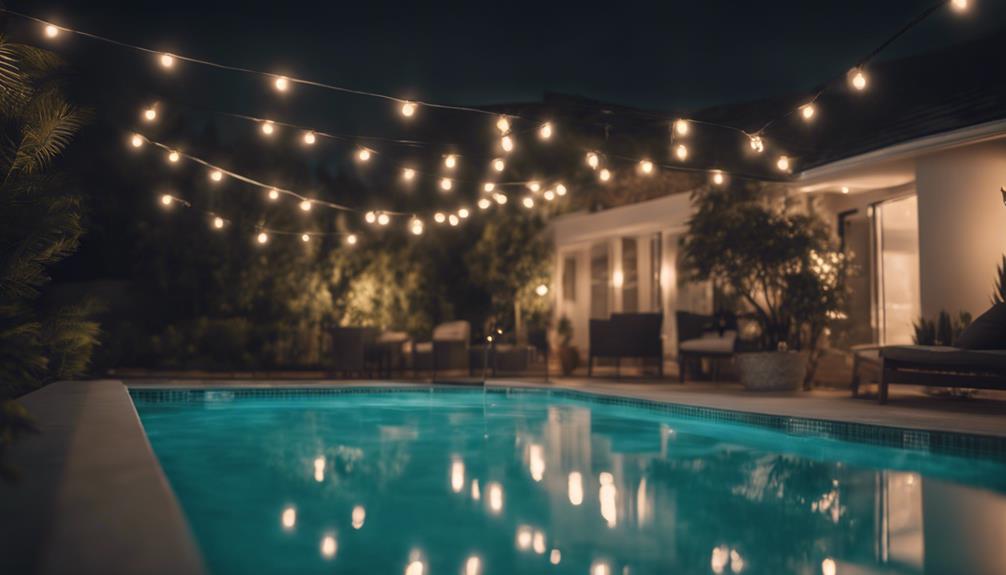
Consult with pool lighting experts to guarantee the safe installation and maintenance of your pool lighting system. When you contact the experts, they can provide you with valuable information on safety guidelines that will help keep your pool area secure. These specialists have the knowledge and experience to make sure that your pool lights are installed correctly and maintained properly, following all necessary safety regulations.
By reaching out to pool lighting professionals, you can benefit from their expertise in selecting the right type of lights for your pool. They can guide you on choosing lights that not only enhance the aesthetics of your pool but also prioritize safety. Consulting with these experts can prevent potential hazards and accidents, giving you peace of mind while enjoying your swimming experience.
Make sure to contact pool lighting specialists to create a safe and enjoyable environment for your family and friends. Their advice and assistance will help you maintain a well-lit and secure pool area for everyone to enjoy.
Maintenance Tips for Pool Lights
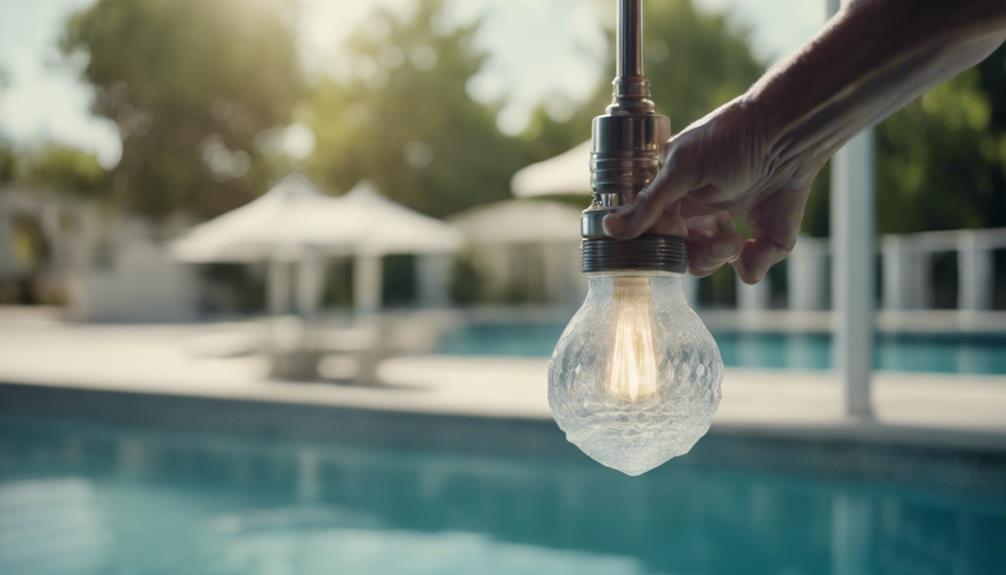
Let's chat about keeping those pool lights shining bright.
Remember to swap out the bulbs regularly to avoid dim or flickering lights.
Also, don't forget to give them a good clean and check for any signs of wear and tear.
A little maintenance can go a long way in keeping your pool area safe and looking fantastic!
Bulb Replacement Frequency
For maintaining peak performance, it's advised to replace pool light bulbs every 2-3 years. Regularly changing your pool light bulbs not only keeps things bright and visible underwater but also helps prevent issues like dimming or flickering lights.
Plus, by swapping out those old bulbs in a timely manner, you can avoid those pesky spikes in your electricity bill caused by energy-hungry older bulbs. Safety is also a significant factor when it comes to keeping your swimming pool well-lit.
Now, here are some key points to take into account regarding the replacement frequency of your pool light bulbs:
- 2-3 Year Rule: Aim to replace your pool light bulbs every 2-3 years for peak performance.
- Consistent Brightness: Regular replacements ensure a steady level of brightness and visibility in your pool.
- Prevent Issues: Timely changes can help avert problems like dim lighting or flickering.
- Energy Efficiency: Newer bulbs are more energy-efficient, helping you save on electricity costs in the long run.
Cleaning and Inspections
Regularly cleaning and inspecting your pool lights is essential for ensuring their safety and functionality. Over time, dirt, debris, and even sneaky algae can build up on your pool lights, messing with their performance and lifespan.
By giving them a good scrub and checking for any cracks, leaks, or loose connections, you're not only keeping your pool area looking sharp but also preventing any electrical mishaps. Safety first, right?
Plus, when you take the time to clean your pool lights regularly, you're also making sure they stay nice and bright, keeping your nighttime swims fun and well-lit. Think of it as giving your pool lights a little TLC – they work hard to illuminate your pool, so why not show them some love back?
Trust us, a little cleaning and inspection can go a long way in keeping your pool lights safe and shining bright.
Frequently Asked Questions
How Safe Are Pool Lights?
Pool lights are generally safe when installed correctly by a licensed electrician. Waterproof pool lights are a must to prevent any accidents.
Regular maintenance and inspections are key to avoiding safety issues. Using Ground Fault Circuit Interrupters adds an extra layer of protection in case of water contact.
Opt for quality LED lights from trusted sources to guarantee safety and longevity. Overall, with proper installation and care, pool lights can be a safe addition to your swimming pool.
Are Pool Lights Grounded?
So, when it comes to pool lights, it's vital to make sure they're properly grounded. This means they're set up in a way that keeps the electrical currents in check, steering them away from the water to prevent any shocking situations.
To guarantee safety, always opt for pool lights that are correctly grounded and have ground fault circuit interrupters (GFCIs) in place. Remember, safety first – it's worth it!
Do LED Pool Lights Need to Be Submerged?
Immerse yourself and light up your pool fun!
LED pool lights absolutely need to be submerged underwater to shine bright like a diamond! Dunking them in H2O keeps them safe, sound, and ready to light up your pool party.
These lights are waterproof wonders, so submerging them keeps them happy and glowing. Remember, a submerged LED light is a happy LED light, making your pool look like a starry night sky.
Immerse yourself and light up your pool fun!
Can Pool Lights Burn Out?
Yep, pool lights can totally burn out. It can happen from using them a bunch, getting old, or even if there's a defect in the manufacturing.
Things like wonky voltage or water messing with the lights can also pitch in.
Keep those lights in check with regular maintenance to stop them from fizzling out too soon.
What Factors Affect the Safety and Lifespan of Swimming Pool Lights?
The safety and lifespan of swimming pool lights are influenced by various factors such as the quality of the materials used, proper installation, regular maintenance, and the type of environment they are exposed to. These factors can all contribute to the overall swimming pool lights lifespan and ensure a safe and enjoyable swimming experience.
Conclusion
So, there you have it! Remember, safety always comes first when it comes to swimming pool lights.
Make sure to follow the proper guidelines for installation, opt for waterproof LED lights, and schedule regular maintenance to prevent any accidents.
By taking these precautions, you can enjoy a beautiful and safe swimming experience all summer long.
Stay safe and have fun in the pool!

